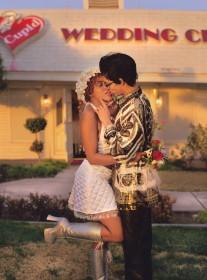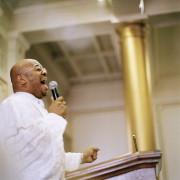Couples on a tight budget want a simple, inexpensive solution to the wedding ceremony. Civil ceremonies are an easy choice.
When you begin the challenging job of planning your wedding, it is important to quickly nail down all of the details surrounding your wedding ceremony. Many couples today are opting for a civil ceremony. Known by most as the fastest, easiest way to get hitched, the real beauty of a civil ceremony is its flexibility. The ceremony details will be determined by you, and there is no limit to the customization you bring to the process.
Below are some details to consider when planning a civil ceremony.
Below are some details to consider when planning a civil ceremony.
Who Has A Civil Ceremony?
Who Has A Civil Ceremony?
The civil ceremony is not just for irreligious couples who want to cut to the chase with a quick "I Do" in front of a justice of the peace at City Hall. Some couples on a tight budget want a simple, inexpensive solution to the wedding ceremony. Most civil ceremony couples are either not sure of their religious convictions, or need a non-religion option for any number of reasons. Additionally, some couples want to include specific readings, poems, officiants, vows, music, or other details in their ceremony that might be counter to the rules of certain religions. The civil ceremony can be the perfect solution if you encounter these conflicts.
Where Can A Civil Ceremony Be Performed?
Where Can A Civil Ceremony Be Performed?
Though civil ceremonies are most often performed in the offices of an officiant in a City Hall, as their numbers have increased, so have the variations in ceremony location. To make it easier on the guests, some couples choose to designate a special area at their reception site. Others have it at a rented mansion, a hotel room, poolside, on a cruise ship or yacht, on the ski slope, at a sporting event, in a garden, on the beach, and even in a hospital delivery room! Your imagination is the only thing limiting your civil ceremony location. Just remember to keep your guests in mind. They will need to have easy access to the site, as well as a view from a comfortable place. Some couples have the ceremony in the comfort of their own home, followed by an intimate at-home reception.
Who Can Perform A Civil Ceremony?
Who Can Perform A Civil Ceremony?
The answer depends on the state and country where you plan to get married. You should check with the local marriage license bureau or municipal county clerk's office to determine who is legally recognized to perform a civil ceremony. They will certainly know the policies and laws you have to keep in mind as you go through the planning process.
In most American states, there are many officiant options. You'd be surprised how many official jobholders are authorized to perform the ceremony. Some couples want a specific, unauthorized individual who is special to them to perform their ceremony. Usually, this is possible as long as a licensed local official witnesses the event and fills out the legal documents.
The officiants listed below are commonly authorized to perform civil ceremonies.
Chaplain
County clerk
Judge
Justice of the peace
Mayor
Minister
Notary public
Pastor
Priest
Rabbi
Superior court clerk
Township council member
Remember, it is important to contact your officiant to determine the counseling, fees, paper work, and other logistics that may be required in order for your civil ceremony to be considered a legally binding event.
In most American states, there are many officiant options. You'd be surprised how many official jobholders are authorized to perform the ceremony. Some couples want a specific, unauthorized individual who is special to them to perform their ceremony. Usually, this is possible as long as a licensed local official witnesses the event and fills out the legal documents.
The officiants listed below are commonly authorized to perform civil ceremonies.
Chaplain
County clerk
Judge
Justice of the peace
Mayor
Minister
Notary public
Pastor
Priest
Rabbi
Superior court clerk
Township council member
Remember, it is important to contact your officiant to determine the counseling, fees, paper work, and other logistics that may be required in order for your civil ceremony to be considered a legally binding event.
Design Your Own Civil Ceremony
Design Your Own Civil Ceremony
Because it can be flexible and informal, the civil ceremony dress code is even up in the air. Usually the bride will wear a wedding gown and the groom a suit, though some brides prefer more informal attire. Things can get really creative when you desire a themed civil ceremony such as Halloween, Hawaiian, Western, Hollywood, etc. And complete freedom of choice carries over into the selection of music.
Most civil ceremony officiants have experience writing the ceremony. But you might want to include your own work or the words of noted authors or poets in your readings, vows, or other symbolic acts. You can certainly involve your family and friends as well. Read our Ceremony Poetry And Vows suggestions here on the site.
Usually, the ceremony consists of the following sections, listed in order of occurrence.
Opening words
Readings
Consent
Vows
Ring exchange
Final thoughts or readings
Closing words
Civil ceremonies usually eliminate other traditional moments such as the processional, the ring bearer, religious readings, and the recessional. But, as with the rest of the ceremony, you should feel free to include any aspect of any traditional ceremony you would like.
Most civil ceremony officiants have experience writing the ceremony. But you might want to include your own work or the words of noted authors or poets in your readings, vows, or other symbolic acts. You can certainly involve your family and friends as well. Read our Ceremony Poetry And Vows suggestions here on the site.
Usually, the ceremony consists of the following sections, listed in order of occurrence.
Opening words
Readings
Consent
Vows
Ring exchange
Final thoughts or readings
Closing words
Civil ceremonies usually eliminate other traditional moments such as the processional, the ring bearer, religious readings, and the recessional. But, as with the rest of the ceremony, you should feel free to include any aspect of any traditional ceremony you would like.
Ceremony Length
Ceremony Length
There is no set length for a civil wedding ceremony. One officiant we found performed an event that lasted four seconds, and then had one that ended after a long-winded 80 minutes. Quicker is often preferred by your guests, so keep that in mind. But also remember the special nature of the occasion and be sure to include any important personal touches. Do what feels right and natural for your special day.
Have Fun
The civil ceremony is a flexible option. It can alleviate consternation over planning and execution. It lacks the formality of other ceremonies, so if you have a civil ceremony, take advantage of it and design a very meaningful, personal event. After customizing it, be sure that your officiant and any others participating in the ceremony are all on the same page so it flows smoothly. A rehearsal is always useful for any ceremony, but if you'd prefer not to have one, be sure to discuss the order of events with everyone at sometime before the big day. Above all, have fun with the wedding, it will be a special time!
Have Fun
The civil ceremony is a flexible option. It can alleviate consternation over planning and execution. It lacks the formality of other ceremonies, so if you have a civil ceremony, take advantage of it and design a very meaningful, personal event. After customizing it, be sure that your officiant and any others participating in the ceremony are all on the same page so it flows smoothly. A rehearsal is always useful for any ceremony, but if you'd prefer not to have one, be sure to discuss the order of events with everyone at sometime before the big day. Above all, have fun with the wedding, it will be a special time!
Category:





